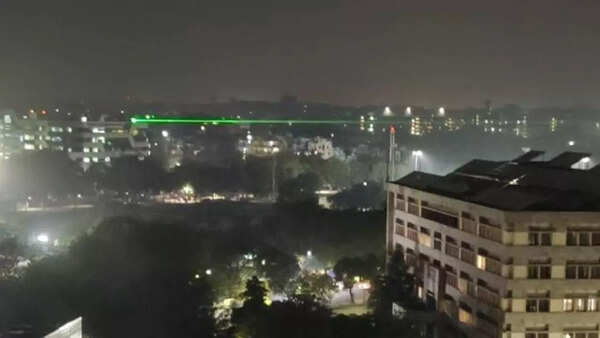In an increasingly digital world, where systems from banking to defense rely on intricate networks, the rise of quantum computing poses a significant threat to traditional encryption methods. The ability of quantum computers to break complex mathematical codes in seconds has spurred a global race to develop quantum-safe communication networks, with India emerging as a key player.

Quantum communication, once a concept confined to science fiction, is rapidly becoming a reality. As India pioneers the creation of a quantum internet, sensitive data, from banking details to health records, could be protected by unbreakable encryption. Spearheaded by the Indian Space Research Organisation (ISRO) and the Defence Research and Development Organisation (DRDO), India is not merely participating in the quantum revolution; it is actively driving it.
India's proactive approach to the quantum challenge is exemplified by the work of ISRO and DRDO, two agencies at the forefront of secure communication innovation.
ISRO has successfully demonstrated free-space quantum communication over a distance of 300 meters, encrypting a live video conference using quantum keys. This achievement lays the groundwork for future satellite-based quantum communication, enabling secure information transfer across vast distances.

DRDO, in collaboration with IIT-Delhi, has achieved a breakthrough in secure quantum communication, transmitting entangled photons over free-space optical links spanning 1 kilometer. The system achieved a secure key exchange rate of 240 bits per second with a negligible error rate, facilitating real-time quantum encryption.
Furthermore, DRDO has conducted experiments on quantum key distribution over 100 km of commercial optical fiber, confirming the readiness of India's infrastructure to support scalable quantum cybersecurity solutions.
India's quantum communication strategy incorporates three key elements:
Current encryption methods rely on the computational difficulty of solving complex mathematical problems. While classical computers may take years to crack these codes, quantum computers could potentially do so in seconds. The advent of quantum technology poses a risk to sensitive information globally, potentially exposing emails, financial transactions, and military communications to interception and decryption.
Quantum-safe communication is built upon a phenomenon known as quantum entanglement. When two particles are entangled, the state of one instantaneously affects the other, regardless of distance. This principle underpins Quantum Key Distribution (QKD), a technique that employs entangled photons to exchange encryption keys.
QKD offers a revolutionary approach to security. Any attempt to intercept the key alters its quantum state, alerting users and rendering the key unusable. Security is maintained not through mathematical complexity, but through the fundamental laws of physics.
Quantum-secure communication is not only a scientific advancement but also a strategic necessity. In an era defined by sophisticated cyber warfare, India's dual-use approach, serving both civilian and defense needs, enables the nation to protect sensitive communications against hackers and foreign intrusions.
By integrating ISRO's satellite technology with DRDO's cybersecurity expertise, India is establishing the foundation for a national quantum communications network. This network has the potential to safeguard everything from border communications to e-commerce transactions.
While China currently leads in satellite quantum communication, India is rapidly advancing. Supported by a strong academic and industrial ecosystem, including DRDO-Industry-Academia Centres of Excellence, India is cultivating the next generation of quantum scientists and engineers. This ensures the nation remains at the forefront of a field poised to redefine cybersecurity in the coming century.
Newer articles
Older articles
 Wimbledon’s youthful buzz: Smelling of teen spirit ahead of the Championships
Wimbledon’s youthful buzz: Smelling of teen spirit ahead of the Championships
 Nitish Rana Set for Delhi Return After Disappointing Uttar Pradesh Stint
Nitish Rana Set for Delhi Return After Disappointing Uttar Pradesh Stint
 Chess Sensation Praggnanandhaa Joins Magnus Carlsen's Team Liquid Ahead of Esports World Cup
Chess Sensation Praggnanandhaa Joins Magnus Carlsen's Team Liquid Ahead of Esports World Cup
 Gavaskar Calls for Kuldeep Yadav Inclusion in Second Test Amid Bumrah Fitness Concerns
Gavaskar Calls for Kuldeep Yadav Inclusion in Second Test Amid Bumrah Fitness Concerns
 Bennett to take no further part in SA Test, Masvaure named concussion substitute
Bennett to take no further part in SA Test, Masvaure named concussion substitute
 Stokes Lauds England's Opening Duo After Stunning Headingley Chase Against India
Stokes Lauds England's Opening Duo After Stunning Headingley Chase Against India
 Rishabh Pant Redefining Cricket: Greg Chappell Hails Wicketkeeper-Batter as a "Match-Winner"
Rishabh Pant Redefining Cricket: Greg Chappell Hails Wicketkeeper-Batter as a "Match-Winner"
 Nitish Rana Eyes Delhi Return After Disappointing Uttar Pradesh Stint
Nitish Rana Eyes Delhi Return After Disappointing Uttar Pradesh Stint
 India Squad Update: Harshit Rana Released Ahead of Second Test Against England in Birmingham
India Squad Update: Harshit Rana Released Ahead of Second Test Against England in Birmingham
 Steve Smith Eyes Grenada Test Return After Finger Injury
Steve Smith Eyes Grenada Test Return After Finger Injury